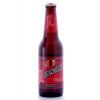Brouwerij Rodenbach - Rodenbach
-
ABV:
5.2% -
Serving Temperature:
42-50° F -
Suggested Glassware:
Flute or Tulip
The classic Rodenbach is a blend of roughly 75% young beer and 25% aged for 2 years in 150-year-old barrels, so for the best experience be sure to use a glass with this beer and give it a few minutes to warm up from fridge temp. On the pour, it presents an attractive reddish-brown hue capped by a fairly thick off-white head that drops to a persistent collar. Expect an exceptionally complex aroma profile with a distinct, tart, fruity quality. Look for notes of sour cherries, oak, caramel and brown sugar, and an acetic (vinegary) touch. On the palate, Rodenbach is supremely refined and smooth, bringing moderate sweetness with notes of cherry and passion fruit, some oaky woodiness, and earth. Hop bitterness is very mild, with the sweetness balanced instead by the beer’s distinct acidic and sour wine-like quality. The sourness of Rodenbach is actually fairly tame compared to others of the style, including Rodenbach’s own Grand Cru, which has a much higher percentage of 2-year-aged beer in the blend. With such a strong acidity, Flemish Red Ales make excellent companions to food, especially Camembert, Brie, and other earthy cheeses.
Sour beers of all stripes have become extremely popular in the US craft beer industry over the last couple years, and we have beers like Rodenbach to thank for inspiring our adventurous domestic brewmasters. Cheers to that!
Yes, the beer is supposed to smell and taste like that. Read on…
There is perhaps no more famous brewery in all Belgium than Brouwerij Rodenbach. Belgium has a long history of brewing both tart and downright sour beers using wild yeast and bacteria, but it was Rodenbach in the late 19th century that helped pioneer and define the specific style of beer we know as Flemish Red Ale (a.k.a. Flanders Red Ale), considered by many to be the most vinous, or wine-like, of all beer styles. Rodenbach’s beers are world classics – absolute benchmarks for the style – and it’s our pleasure to bring this special beer to you this month.
The brewery bears the name of the Rodenbach family, who not only contributed their unique beer to the world, but also helped contribute Belgium to the world, at least as an independent country. The brewery was founded in 1821 by Rodenbach brothers Pedro, Alexander, Ferdinand, and Constantijn. All four played critical roles in the Belgian Revolution of 1830, which led to the secession of Belgium from the United Kingdom of the Netherlands. In fact, when Leopold I greeted the crowd from the balcony of the House of the Nation after being crowned king, Alexander (who ran the brewery from 1821 to 1836, and happened to be blind), appeared at his side.
In 1878, Pedro’s grandson Eugène became manager of the family brewery. From a brewing perspective, as opposed to a political one, Eugène is certainly the most influential Rodenbach in the family line. During his travels to southern England he was exposed to, and learned much about, the early porter beers popular in London at the time. In the 19th century, these early porters were typically aged for at least several months in giant barrels where they matured and acidified. Eugène took what he learned and applied it at home in Belgium, developing and refining the technique, and creating the style of Rodenbach beer we know today. Sadly, Eugène died in 1889 at the age of just 39.
Rodenbach’s red ales undergo a primary and a secondary fermentation, with both yeast and lactobacillus bacteria, creating a beer with a distinctively acidic, sour quality. However, it’s when the beers enter the maturation stage that the fun really begins. The beer is aged in huge oak barrels known as “foeders” in Flemish (“foudres” in French), some of which are as old as 150 years. During the maturation, the bacteria continue to work, imbuing the beer with fruity esters that even the most active yeast strains would be hard-pressed to match. Each foeder matures at its own pace and develops its own unique character, so there’s no specific timetable for when maturation of any given foeder is complete. Instead, the brewmasters not only determine when the beer is ready, they must blend beer drawn from different foeders in different amounts to create the flavor you experience from the bottle. While remarkably consistent, slight variation in the character of Rodenbach’s beers from one bottling to another is part of the charm of this truly hand-crafted style of beer – in some ways reminiscent of different vintages of wine.

Unmatched Variety by style, brewery & country
Choose from Five different Beer Clubs offering unmatched variety by brewery,
country of origin, and beer style to suit your specific tastes.


